Mikey Brooks's Blog, page 23
February 8, 2013
Author/ Illustrator Interview: Travis Hanson
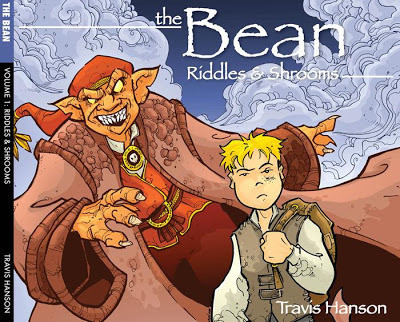 I'm excited to share with you Travis Hanson, an Eisner nominated creator of the webcomic/graphic novel series the bean. An epic fantasy tale of a dishwasher. I have been a fan of Travis’ work and was happy he accepted the invitation to be interviewed. Here is a little about him:
I'm excited to share with you Travis Hanson, an Eisner nominated creator of the webcomic/graphic novel series the bean. An epic fantasy tale of a dishwasher. I have been a fan of Travis’ work and was happy he accepted the invitation to be interviewed. Here is a little about him: 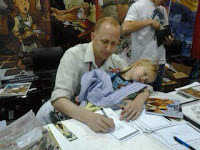 Travis Hanson: I am an artist and storyteller. I have been illustrating professionally for about 15 years now. I am also a father of 5 incredible kids, and husband of a beautiful enduring wife. “the Bean” is my story. Published both as a webcomic and as printed graphic novels. In 2011 Bean was nominated for an Eisner in the “Best Digital”. That was a huge motivation to keep the story going. I am lover of fantasy art and epic story telling. I am also a believer that “If you truly want something bad enough, you will find a way to make it happen.”. I also believe that it is our responsibility to teach others how to achieve their dreams as well. Yet, in the end it really comes down to how bad do you want to see your own dream happen.
Travis Hanson: I am an artist and storyteller. I have been illustrating professionally for about 15 years now. I am also a father of 5 incredible kids, and husband of a beautiful enduring wife. “the Bean” is my story. Published both as a webcomic and as printed graphic novels. In 2011 Bean was nominated for an Eisner in the “Best Digital”. That was a huge motivation to keep the story going. I am lover of fantasy art and epic story telling. I am also a believer that “If you truly want something bad enough, you will find a way to make it happen.”. I also believe that it is our responsibility to teach others how to achieve their dreams as well. Yet, in the end it really comes down to how bad do you want to see your own dream happen.
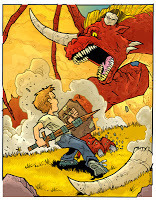 I have to say I am a fan of your work and look forward to your weekly posts. The Bean series is a compilation of graphic novels. For those unfamiliar with graphic novels can your share what sets these apart from say comic books?
I have to say I am a fan of your work and look forward to your weekly posts. The Bean series is a compilation of graphic novels. For those unfamiliar with graphic novels can your share what sets these apart from say comic books? Travis Hanson: Why thank you, I am excited you are enjoying my fantasy adventure of a dishwasher. I would say though as for what sets graphic novels apart from comics is not much really. They are comics and they both tell a story. Comic books though tend to tell in 24 pages while graphic novels take a little longer.
As an illustrator myself, I know that hours of work go into creating one illustration; from sketching, to penning, then paining it can be a challenge. Can you explain the process you go through in creating your art?
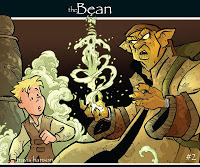 Travis Hanson: It usually just starts with a sketch. Nothing more, nothing less. Once I get the pencils done, I then ink on vellum, tracing paper. This creates a perfect piece of line art when I scan. After that it goes into a layout program or a coloring program, depending on the needs. Music though is a big part of my art. I use it all the time in the creation process.
Travis Hanson: It usually just starts with a sketch. Nothing more, nothing less. Once I get the pencils done, I then ink on vellum, tracing paper. This creates a perfect piece of line art when I scan. After that it goes into a layout program or a coloring program, depending on the needs. Music though is a big part of my art. I use it all the time in the creation process.How did you get your start in illustrating? Have you always done it or was it something you picked up later in life?
Travis Hanson: I have always drawn pictures but I did not get into the industry until my mid-twenties. I got a little sidetrack and then was pleasantly reminded that artistic gifts can go away if you do nothing with them, After that I got my first job as a cartoonist for a local print shop and the rest is history. :)
I can tell from The Bean series that you favor fantasy and epic stories. What inspired you to write these books?
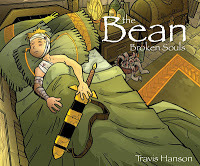 Travis Hanson: I love epic fantasy and my inspiration comes from many sources. Books like Bone and ElfQuest, to a general disdain of doing dishes, to watching my kids play. It all sort of just got lumped together and gelled. I am still getting inspiration on my story though and it is getting stronger because of it.
Travis Hanson: I love epic fantasy and my inspiration comes from many sources. Books like Bone and ElfQuest, to a general disdain of doing dishes, to watching my kids play. It all sort of just got lumped together and gelled. I am still getting inspiration on my story though and it is getting stronger because of it.I believe you used a Kickstarter program to help publish your series of graphic novels. Can you share how that worked and if you recommend others like you to use it? How has your journey to publication been?
Travis Hanson: I have run 3 successful Kickstarter campaigns. Each one was stronger than the last. It's been a fantastic ride. The key though is to have an audience (hence my love for webcomics) and build off that. I would also say prepare. Just don’t jump into it. It can be a very, very bumpy ride. :)
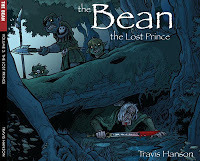 I am a fan of James Owen and I have a quote of his attached to my computer screen. It helps me stay positive and focus on my goals as an author/illustrator. “Never, ever, sacrifice what you want most, for what you want most at the moment.” I’ve seen that you and I favor a lot of the same artists. Can you share one or two things that you have learned from your mentors?
I am a fan of James Owen and I have a quote of his attached to my computer screen. It helps me stay positive and focus on my goals as an author/illustrator. “Never, ever, sacrifice what you want most, for what you want most at the moment.” I’ve seen that you and I favor a lot of the same artists. Can you share one or two things that you have learned from your mentors? Travis Hanson: James asked me a question when I first got into this field. He asked, “Trav, how bad do you want this?” before I could answer he stopped me and said, “you cannot tell me how bad you want it, you have to show me.” I have lived by that ever since.
What are some tips you can share to an author/illustrator just starting out?
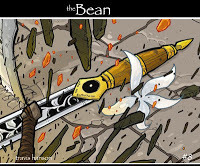 Travis Hanson: Stick it out, pay your dues, listen to c/c, treat it as a job, and . . . “How bad do you want it?” I can't repeat that enough. Only you as a creator know the answer to that and if you want something bad enough you will figure out how to be successful at it—No matter what the odds.
Travis Hanson: Stick it out, pay your dues, listen to c/c, treat it as a job, and . . . “How bad do you want it?” I can't repeat that enough. Only you as a creator know the answer to that and if you want something bad enough you will figure out how to be successful at it—No matter what the odds.Is there anything else you’d like to share or shout out?
 Travis Hanson: That dreams are meant to be followed and sometimes it's a rough road, but in the end the payoff is not always monetary but satisfaction that you created something that people appreciate.
Travis Hanson: That dreams are meant to be followed and sometimes it's a rough road, but in the end the payoff is not always monetary but satisfaction that you created something that people appreciate. Thank you so much Travis, these are words to truly live by. For more information on Travis Hanson creator of the Bean series, visit his website at: http://www.beanleafpress.com/. You can also find him on Twitter at: @Travsthebean, on Facebook as Travis Hanson - The Bean
Published on February 08, 2013 00:00
February 4, 2013
Author Interview: Ryan Hunter

I am happy to introduce you to Ryan Hunter author of the new dystopian thriller inDIVISIBLE. I met Ryan in our writer’s group The Authors’ Think Tank. When she asked if anyone was interested in sharing her new book I jumped at the opportunity. Ryan Hunter is a published author, journalist and freelance writer. She enjoys the outdoors, hiking, running, baking and chocolate. Her passion in writing is suspense. Her passion in life is her family - oh and adrenaline.
I love the underlining theme of your novel that we as people take our freedoms for granted. Is there something that inspired you to write this book?
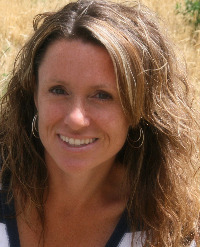 Ryan Hunter: inDIVISIBLE started as a dream, a dream that left me with a disturbed feeling that I couldn’t shake. I had this crazy desire to write this story, and I couldn’t put it off. Once I started plotting, I had a trilogy outlined in a single day, and the words just flowed when I began to write. It was beautiful.
Ryan Hunter: inDIVISIBLE started as a dream, a dream that left me with a disturbed feeling that I couldn’t shake. I had this crazy desire to write this story, and I couldn’t put it off. Once I started plotting, I had a trilogy outlined in a single day, and the words just flowed when I began to write. It was beautiful.I put a lot of myself into this story … ideas, feelings and thoughts like anger at my daughter’s old school for telling me, “Children at E**** Elementary are not allowed to excel” and the horror of the idea that the original draft of Obamacare actually included the option to allow devices to be inserted into us to keep files on us. It all just merged to create this world of One United that amazed me even as the words spilled onto the page.
InDIVISIBLE is a dystopian thriller. Can you give tips on how to create a fractured world that mirrors our own?
Ryan Hunter: I actually hadn’t read much dystopian before writing inDIVISIBLE, mostly because I didn’t want it to feel too much like the other novels out there. I wanted it to be its own story because of how intense the initial idea felt to me. So, I think that’s my first bit of advice: find your own voice in dystopia.
Find an issue or set of issues that you think could be exploited by the government or blown out of proportion … what happens next? How would that affect the general population and how could that continue to multiply? As the government moves to enforce actions or counter plagues, does it make them more powerful or weak?
I think I like to take issues or fears I see every day and blow them up, make them a little excessive and just go with it.
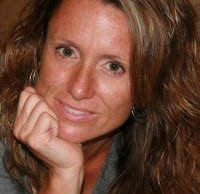 If you were a utensil would you rather be a fork or a spoon. Please share why.
If you were a utensil would you rather be a fork or a spoon. Please share why.Ryan Hunter: I’ve absolutely never even considered this before this moment … but I’m going to have to go for it all. We have this super cool fork spoon knife thingy. I’d have to be that. Seriously, fork on one end with a knife on the side of the last prong, spoon on the other end. Entirely useful. Strange but useful and fun.
What have you learned most about yourself while writing this book?
Ryan Hunter: I went through a long period of depression prior to writing inDIVISIBLEand when I sat down to start I was scared. I still lacked confidence but I knew I had to write the story of One United. I grew a lot, gained confidence and felt fulfilled again by the end. Then when I sat down to write a short dedication at the beginning, I realized what the biggest message in the book was, and it was for me more than anyone.
inDIVISIBLE begins with Brynn, a girl whose life is turned upside down, who’s scared and yet determined to see changes in her life. She pursues her dreams despite the fear, and I realized that it’s a message of determination. Sometimes we have to go through hard experiences to become our best and sometimes accomplishments only come about after pushing ourselves further than we ever imagined possible. Life can be hard, but we determine how we handle it.
Can you share your experience getting your book published? What made you decide to go indie?
Ryan Hunter: I went the traditional publishing route while writing under my other name, Robyn Heirtzler, but I decided the market’s changing enough that I wanted to play with it and see what I could do on my own. It’s been a great experience and I’ve learned a lot.
What is your writing technique? Are you an outliner? Keyboard or pen?
Ryan Hunter: When writing, I know the beginning, the major hurdles and an approximate ending before I begin, but I don’t plot it all in detail right away. I plot a few chapters and being writing. As the story takes form, I plot a little further and a little further, writing as I go. I find I’m more creative and the story stays fresh when I plot as I go. If I plot the entire novel, it restricts me too much and I get really bored with the storyline before I get halfway through. But if I experience it for the first time just ahead of each chapter, I keep momentum and excitement!
Occasionally I sketch my characters in my notebook but otherwise, I do everything on my laptop. I’m not fast enough writing by hand to keep up with my own thoughts.
I’ve read reviews that share you leave the book open for a sequel. Is there a sequel planned? When do you hope to have it available?
Ryan Hunter: I’m working on the sequel now and I’m excited about it. There are some new characters, some twists and definitely more adventure. I’d say more, but I think I’ll let you read it when it comes out this spring.
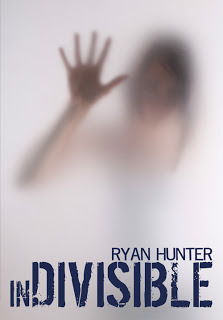
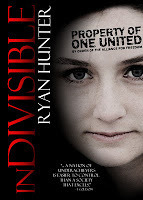 Is there anything else you’d like to share about the book or shout out to readers?
Is there anything else you’d like to share about the book or shout out to readers?Ryan Hunter: Funny you should ask … I’ve had some feedback recently that made me reconsider the cover for inDIVISIBLE and so I decided, why not try something a little different and see if it gets a better response. I think the new cover captures the feel of the novel better and better portrays a YA novel. In fact, you’re the first blog, aside from my own, to show off the new cover. What do you think?
I think the new cover is amazing. Much more thrilling. I am privileged to be the first blogger to show it off. Thanks for allowing me to do this interview with you and good luck writing the sequel!
You can find more about Ryan Hunter and her novel inDIVISIBLE by going to: http://authorryanhunter.blogspot.com/or visiting her Amazon author page at http://www.amazon.com/Ryan-Hunter/e/B009HX2HR0/ref=ntt_athr_dp_pel_1.Book Trailer: http://www.youtube.com/watch?v=yGbjp8...
Published on February 04, 2013 00:00
January 28, 2013
‘Authors Tagging Authors’ Blog Hop
That’s right I’m up next on the ‘Authors Tagging Authors’ blog hop.
Just to introduce myself, for those of you new to this blog, I am Mikey Brooks and I am an author/illustrator. Here you'll find lovely tips on writing, illustrating, and more, as well as fantastic interviews by people who know the answers. All the books that I currently have out are picture books, and I feel I have talked about them for ages. So I’ve decided to share a little about the other side of my writing—Middle-Grade fantasy. CasPeace , who invited me to on the blog tour, gave me a list of questions that I hope I can give fun responses to. Check out here fabulous blog at http://peacewrites.blogspot.com. She shares info on her new novel, King’s Artesan , book three in her awesome fantasy series, The Artesans of Albia.
So here goes the questions:
What is the working title of your next book?
The Dream Keeper. It is the first book in a series of adventures that takes place in both our world and the dream world. I’m still working on the tile for the series. I’m kind of leaning toward The Dream Keeper Chronicles.
Where did the idea come from for the book?
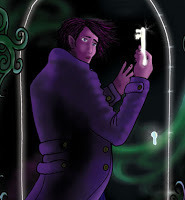 What’s funny is that this book is about dreams and it came from a dream. I remember the night it happened. My wife and I were lying in bed at it had turned 11:11pm. She told me it was what she called the ‘wishing minute’ and for the next 60 seconds I could wish for something. I had just finished writing a chapter book about fairies and thought I should wish for an idea for a new project. A few minutes later I was somewhere between sleep and awake when the whole story of the first book unfolded. I sat up in bed, woke my wife up, and told her the storyline. She had me write it down. That was the beginning of The Dream Keeper.
What’s funny is that this book is about dreams and it came from a dream. I remember the night it happened. My wife and I were lying in bed at it had turned 11:11pm. She told me it was what she called the ‘wishing minute’ and for the next 60 seconds I could wish for something. I had just finished writing a chapter book about fairies and thought I should wish for an idea for a new project. A few minutes later I was somewhere between sleep and awake when the whole story of the first book unfolded. I sat up in bed, woke my wife up, and told her the storyline. She had me write it down. That was the beginning of The Dream Keeper.
What genre does your book fall under?
It is defiantly a middle-grade adventure with both a toe in the real world and the fantastic.
What actors would you choose to play the part of your characters in a movie rendition?
This is an awesome question! I had never thought about it before. Cas Peace and I spent a while online chatting about the best actors to cast in our future movie production. It was a lot of fun! Because she edited my manuscript for me, by the way she's a fantastic editor, she was familiar with some of my characters. But for you who haven't read the book yet, here's a little info:
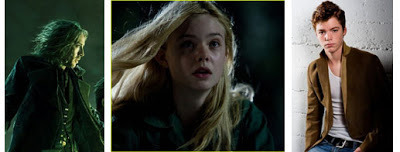 The book has three main characters: Gladamyr—the Dream Keeper, Parker—a 12 year old gamer, and Kaelyn—his dream sidekick. For some strange reason I always imagined Gladamyr in my head as Nicholas Cage. Imagine him in a trench coat with purple skin and you’ve got my dream keeper. Parker was actually a real person I knew. I took everything about Parker from the main source. If I chose an actor, probably Gabriel Basso would do a good job. Kaelyn is a conglomerate of two women I admire: my wife and my sister. She is smart, beautiful, and probably the bravest in the book. I think Elle Fanning would make a perfect Kaelyn.
The book has three main characters: Gladamyr—the Dream Keeper, Parker—a 12 year old gamer, and Kaelyn—his dream sidekick. For some strange reason I always imagined Gladamyr in my head as Nicholas Cage. Imagine him in a trench coat with purple skin and you’ve got my dream keeper. Parker was actually a real person I knew. I took everything about Parker from the main source. If I chose an actor, probably Gabriel Basso would do a good job. Kaelyn is a conglomerate of two women I admire: my wife and my sister. She is smart, beautiful, and probably the bravest in the book. I think Elle Fanning would make a perfect Kaelyn.
What is the one sentence synopsis of your book?
A Nightmare named Fyren has taken over the gateway to the dimension of Dreams with the intention of controlling mortals, and it falls on Parker, Kaelyn, and Gladamyr – the Dream Keeper – to stop him.
Will your book be self-published or represented by an agency?
I have been holding out on this book for almost two years now. I want it to have the right home. If I can’t find an amazing publisher to take it on, I’ll be independently publishing it on my own. It’s too good a story not to share.
How long did it take you to write the first draft of the manuscript?
I started this book right before I went into my bachelor’s program at Utah State University. I would work on it every so often while writing papers for school. It took almost 3 years to finish. The second book I wrote that draft in about 2 months.
What other books would you compare this to within your genre?
This book kind of doesn’t mess well with what is out there now, which is why I think I’ve had difficulty getting an agent for it. If I could pick a mixture of books it would be better served. I’d say a highbred of Alice in Wonderland, The Pendragon series, and the 39 Clues. Think action adventure in dreams.
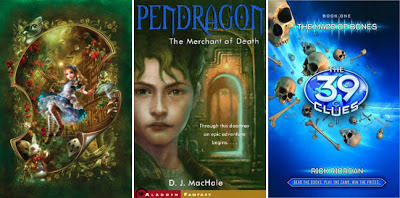 Who or what inspired you to write this book?
Who or what inspired you to write this book?
It started with a dream, but after I got to know the characters then they became the inspiration for it.
What else about the book might pique the reader’s interest?
Aside from encounters with mythical dimensions, and creatures such as shifters, zombies, even a psychotic clown, this book is about two kids learning to overcome the challenges of being true to themselves in a social world that doesn’t encourage such skills. It’s really about facing your nightmares and overcoming them. Thanks for the opportunity to share.
Thanks for the opportunity to share.
We've got terrific writers next up on our 'Authors Tagging Authors' blog hop. Make sure you check them out:
Mercedes M. Yardley writes whimsical horror and wears poisonous flowers in her hair. She is the author of Beautiful Sorrows. Check her out at: http://www.mercedesyardley.com/
Wendy Knight is a writer of YA Urban Fantasy, with her first book, Feudlings, coming out with Astraea Press in March. Check her out at: http://writethroughthenoise.blogspot.com/
Konstanz Silverbow, novel writing, book reading, dragon lover! Currently getting ready to begin querying her first novel. Check her out at: http://nothoughts2small.blogspot.com/
Scott Bryan loves stories about the strange and unusual. He is the author ofthe Night Children series about two vampire children battling the evil vampire Dominic (i.e. Dracula). Check him out at: http://night-children.blogspot.com/
Just to introduce myself, for those of you new to this blog, I am Mikey Brooks and I am an author/illustrator. Here you'll find lovely tips on writing, illustrating, and more, as well as fantastic interviews by people who know the answers. All the books that I currently have out are picture books, and I feel I have talked about them for ages. So I’ve decided to share a little about the other side of my writing—Middle-Grade fantasy. CasPeace , who invited me to on the blog tour, gave me a list of questions that I hope I can give fun responses to. Check out here fabulous blog at http://peacewrites.blogspot.com. She shares info on her new novel, King’s Artesan , book three in her awesome fantasy series, The Artesans of Albia.
So here goes the questions:
What is the working title of your next book?
The Dream Keeper. It is the first book in a series of adventures that takes place in both our world and the dream world. I’m still working on the tile for the series. I’m kind of leaning toward The Dream Keeper Chronicles.
Where did the idea come from for the book?
 What’s funny is that this book is about dreams and it came from a dream. I remember the night it happened. My wife and I were lying in bed at it had turned 11:11pm. She told me it was what she called the ‘wishing minute’ and for the next 60 seconds I could wish for something. I had just finished writing a chapter book about fairies and thought I should wish for an idea for a new project. A few minutes later I was somewhere between sleep and awake when the whole story of the first book unfolded. I sat up in bed, woke my wife up, and told her the storyline. She had me write it down. That was the beginning of The Dream Keeper.
What’s funny is that this book is about dreams and it came from a dream. I remember the night it happened. My wife and I were lying in bed at it had turned 11:11pm. She told me it was what she called the ‘wishing minute’ and for the next 60 seconds I could wish for something. I had just finished writing a chapter book about fairies and thought I should wish for an idea for a new project. A few minutes later I was somewhere between sleep and awake when the whole story of the first book unfolded. I sat up in bed, woke my wife up, and told her the storyline. She had me write it down. That was the beginning of The Dream Keeper.What genre does your book fall under?
It is defiantly a middle-grade adventure with both a toe in the real world and the fantastic.
What actors would you choose to play the part of your characters in a movie rendition?
This is an awesome question! I had never thought about it before. Cas Peace and I spent a while online chatting about the best actors to cast in our future movie production. It was a lot of fun! Because she edited my manuscript for me, by the way she's a fantastic editor, she was familiar with some of my characters. But for you who haven't read the book yet, here's a little info:
 The book has three main characters: Gladamyr—the Dream Keeper, Parker—a 12 year old gamer, and Kaelyn—his dream sidekick. For some strange reason I always imagined Gladamyr in my head as Nicholas Cage. Imagine him in a trench coat with purple skin and you’ve got my dream keeper. Parker was actually a real person I knew. I took everything about Parker from the main source. If I chose an actor, probably Gabriel Basso would do a good job. Kaelyn is a conglomerate of two women I admire: my wife and my sister. She is smart, beautiful, and probably the bravest in the book. I think Elle Fanning would make a perfect Kaelyn.
The book has three main characters: Gladamyr—the Dream Keeper, Parker—a 12 year old gamer, and Kaelyn—his dream sidekick. For some strange reason I always imagined Gladamyr in my head as Nicholas Cage. Imagine him in a trench coat with purple skin and you’ve got my dream keeper. Parker was actually a real person I knew. I took everything about Parker from the main source. If I chose an actor, probably Gabriel Basso would do a good job. Kaelyn is a conglomerate of two women I admire: my wife and my sister. She is smart, beautiful, and probably the bravest in the book. I think Elle Fanning would make a perfect Kaelyn.What is the one sentence synopsis of your book?
A Nightmare named Fyren has taken over the gateway to the dimension of Dreams with the intention of controlling mortals, and it falls on Parker, Kaelyn, and Gladamyr – the Dream Keeper – to stop him.
Will your book be self-published or represented by an agency?
I have been holding out on this book for almost two years now. I want it to have the right home. If I can’t find an amazing publisher to take it on, I’ll be independently publishing it on my own. It’s too good a story not to share.
How long did it take you to write the first draft of the manuscript?
I started this book right before I went into my bachelor’s program at Utah State University. I would work on it every so often while writing papers for school. It took almost 3 years to finish. The second book I wrote that draft in about 2 months.
What other books would you compare this to within your genre?
This book kind of doesn’t mess well with what is out there now, which is why I think I’ve had difficulty getting an agent for it. If I could pick a mixture of books it would be better served. I’d say a highbred of Alice in Wonderland, The Pendragon series, and the 39 Clues. Think action adventure in dreams.
 Who or what inspired you to write this book?
Who or what inspired you to write this book?It started with a dream, but after I got to know the characters then they became the inspiration for it.
What else about the book might pique the reader’s interest?
Aside from encounters with mythical dimensions, and creatures such as shifters, zombies, even a psychotic clown, this book is about two kids learning to overcome the challenges of being true to themselves in a social world that doesn’t encourage such skills. It’s really about facing your nightmares and overcoming them.
 Thanks for the opportunity to share.
Thanks for the opportunity to share.We've got terrific writers next up on our 'Authors Tagging Authors' blog hop. Make sure you check them out:
Mercedes M. Yardley writes whimsical horror and wears poisonous flowers in her hair. She is the author of Beautiful Sorrows. Check her out at: http://www.mercedesyardley.com/
Wendy Knight is a writer of YA Urban Fantasy, with her first book, Feudlings, coming out with Astraea Press in March. Check her out at: http://writethroughthenoise.blogspot.com/
Konstanz Silverbow, novel writing, book reading, dragon lover! Currently getting ready to begin querying her first novel. Check her out at: http://nothoughts2small.blogspot.com/
Scott Bryan loves stories about the strange and unusual. He is the author ofthe Night Children series about two vampire children battling the evil vampire Dominic (i.e. Dracula). Check him out at: http://night-children.blogspot.com/
Published on January 28, 2013 08:00
January 22, 2013
Want a Critique of Your Writing?
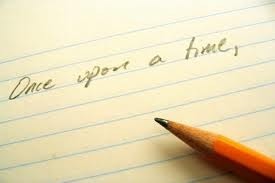 Calling all writers! Want to win a critique of your work? Enter here! Three writers will win a critique of their work: fiction, of any genre, YA or MG and It doesn't have to be finished! Lindsay will read 3 chapters of your work and help you polish it up! The beginning chapters are super important, especially when you're querying agents!Alright---so let's move on to how you can enter. Super easy, you guys. SUPER. Follow this Link:http://lindsaycummingsblog.blogspot.com/2013/01/want-critique-of-your-writing.html?showComment=1358901211778#c8596226623619180668 and Good Luck!!
Calling all writers! Want to win a critique of your work? Enter here! Three writers will win a critique of their work: fiction, of any genre, YA or MG and It doesn't have to be finished! Lindsay will read 3 chapters of your work and help you polish it up! The beginning chapters are super important, especially when you're querying agents!Alright---so let's move on to how you can enter. Super easy, you guys. SUPER. Follow this Link:http://lindsaycummingsblog.blogspot.com/2013/01/want-critique-of-your-writing.html?showComment=1358901211778#c8596226623619180668 and Good Luck!!
Published on January 22, 2013 16:36
January 7, 2013
The Rules of Writing
I am going to start this off by saying that there are no rules to writing. There are rules of grammar and rules of story, but not rules of writing. There are only rules that writers create for other writers. I’ve learned this over the years as I’ve listened to countless authors verbally bash and harshly critique other authors and their decisions when writing.
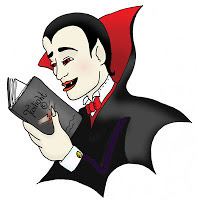
I noticed a lot when I was getting my degree in English. The professors would waste, and I mean WASTE, hours of my life to dissect a single paragraph to figure out why this particular author chose to write this particular thing. I don’t know about other writers, but I do not sit in my office and contemplate for hours a paragraph that will boggle the minds of literary experts. I’d like to know who does and ask them to please get a life. This type of thinking ruined my writing for a few years. After I got out of school it took me a really long time to get my creative side going again. I was too concerned on making every sentence and paragraph shine with literary glory. Sometimes I don’t think getting my degree improved my writing, my understanding of the craft maybe, but not my writing.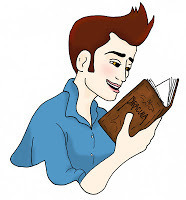 I remember one instance in my capstone program where we were asked to read sections from Bram Stoker’s Dracula and Stephanie Meyer’s Twilight. We were not told what we were to do when we read these just to read them. I thought that we’d be comparing the two and seeing what things Meyer took from Stoker’s tale. It turned into an hour and a half bash on Twilight. What was funny is I found myself the only one in a room of twenty authors that stuck up for Meyer. I asked why we were wasting time bashing someone who wrote a bestselling novel. Obviously Meyer found a way to get people to read her books and we should be discussing that, not how she veered from the rules Stoker created when writing a story about vampires.
I remember one instance in my capstone program where we were asked to read sections from Bram Stoker’s Dracula and Stephanie Meyer’s Twilight. We were not told what we were to do when we read these just to read them. I thought that we’d be comparing the two and seeing what things Meyer took from Stoker’s tale. It turned into an hour and a half bash on Twilight. What was funny is I found myself the only one in a room of twenty authors that stuck up for Meyer. I asked why we were wasting time bashing someone who wrote a bestselling novel. Obviously Meyer found a way to get people to read her books and we should be discussing that, not how she veered from the rules Stoker created when writing a story about vampires.
I think that writers are too harsh on other writers. The readers that I know, and I know more than a few, shared with me that they do not analyze the choices a writer made when writing. They do not ask why this particular author chose to veer from the rules set by their peers. They read to read—to enjoy the story that is there. I hope that writers can lay off the “rules” and just let others create their art. Yes writing is an art and authors are artists. It’s a creative outlet that should not have constrains and rules. I hope you can remember this and be kind to other writers, and be kind to yourself. And that is my key on the rules of writing.

I noticed a lot when I was getting my degree in English. The professors would waste, and I mean WASTE, hours of my life to dissect a single paragraph to figure out why this particular author chose to write this particular thing. I don’t know about other writers, but I do not sit in my office and contemplate for hours a paragraph that will boggle the minds of literary experts. I’d like to know who does and ask them to please get a life. This type of thinking ruined my writing for a few years. After I got out of school it took me a really long time to get my creative side going again. I was too concerned on making every sentence and paragraph shine with literary glory. Sometimes I don’t think getting my degree improved my writing, my understanding of the craft maybe, but not my writing.
 I remember one instance in my capstone program where we were asked to read sections from Bram Stoker’s Dracula and Stephanie Meyer’s Twilight. We were not told what we were to do when we read these just to read them. I thought that we’d be comparing the two and seeing what things Meyer took from Stoker’s tale. It turned into an hour and a half bash on Twilight. What was funny is I found myself the only one in a room of twenty authors that stuck up for Meyer. I asked why we were wasting time bashing someone who wrote a bestselling novel. Obviously Meyer found a way to get people to read her books and we should be discussing that, not how she veered from the rules Stoker created when writing a story about vampires.
I remember one instance in my capstone program where we were asked to read sections from Bram Stoker’s Dracula and Stephanie Meyer’s Twilight. We were not told what we were to do when we read these just to read them. I thought that we’d be comparing the two and seeing what things Meyer took from Stoker’s tale. It turned into an hour and a half bash on Twilight. What was funny is I found myself the only one in a room of twenty authors that stuck up for Meyer. I asked why we were wasting time bashing someone who wrote a bestselling novel. Obviously Meyer found a way to get people to read her books and we should be discussing that, not how she veered from the rules Stoker created when writing a story about vampires.I think that writers are too harsh on other writers. The readers that I know, and I know more than a few, shared with me that they do not analyze the choices a writer made when writing. They do not ask why this particular author chose to veer from the rules set by their peers. They read to read—to enjoy the story that is there. I hope that writers can lay off the “rules” and just let others create their art. Yes writing is an art and authors are artists. It’s a creative outlet that should not have constrains and rules. I hope you can remember this and be kind to other writers, and be kind to yourself. And that is my key on the rules of writing.
Published on January 07, 2013 17:07
January 2, 2013
Tips on attending a Writers conferences
So you want to go to a writers conference? Now what?
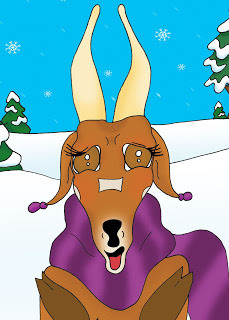 I attended my first writer’s conference about seven years ago and thought it was the greatest experience ever. However, I felt that I could have enjoyed it a lot more had I received some tips from others before I went. The purpose of this post is to hopefully share some tips on those of you desiring to attend conferences this year. I am going to share 10 tips, although I believe there are so many more that I’m not sharing. If you have any words of advice that will benefit others I invite you to share it in the comments.
I attended my first writer’s conference about seven years ago and thought it was the greatest experience ever. However, I felt that I could have enjoyed it a lot more had I received some tips from others before I went. The purpose of this post is to hopefully share some tips on those of you desiring to attend conferences this year. I am going to share 10 tips, although I believe there are so many more that I’m not sharing. If you have any words of advice that will benefit others I invite you to share it in the comments.
1. Plan ahead.Most conferences will share an online schedule or outline of what will be presented at each session. Read it thoroughly and highlight the events that you feel would benefit you the most. Don’t forget to plan out breaks for yourself as well.
2. Have a laptop or note taking device. My first conference I didn’t have anything. I jotted notes down on the back of a program and ended up buying on overpriced notebook to take notes. You will receive some of the best advice from experienced authors, agents, and editors at these conferences. Do not waste that knowledge by not writing it down.
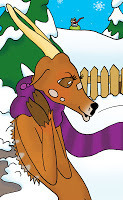 3. Have your elevator speech ready.If you don’t know what I mean here, I’m talking about your hook or sales pitch for your book. You never know who you will run into at these conferences. An elevator speech is something you can plan ahead of time. Review it and say it out loud over and over again. If you ever have a half a minute of an editor’s attention don’t waste it with “umm…umm…” Think of it in this context: You get on the elevator on the fifth floor of the hotel and an editor is there waiting. You have until the main floor to sale your book. What are you going to say? I can’t tell you how embarrassed I was when I met an editor at a conference and he asked me how my work was going, that right he asked me, I then blew it and before I knew it my opportunity was over. Be ready and be prepared. In case that rare moment happens, bring a proposal package. A lot of people might say this isn’t necessary, but you never know. I understand that most of the agents and editors simply don’t have the room to carry a bunch of proposals, but what if you have the opportunity to have a pitch session with an agent or editor and you have nothing to show or give them. It never hurts to be prepared. And you’ll feel more confident knowing you have the package on hand. You may never use it or even think about it, but it never hurts to have a backup. What to have in your package: a basic cover sheet with hook (query), a brief synopsis, first three chapters, or the full manuscript.
3. Have your elevator speech ready.If you don’t know what I mean here, I’m talking about your hook or sales pitch for your book. You never know who you will run into at these conferences. An elevator speech is something you can plan ahead of time. Review it and say it out loud over and over again. If you ever have a half a minute of an editor’s attention don’t waste it with “umm…umm…” Think of it in this context: You get on the elevator on the fifth floor of the hotel and an editor is there waiting. You have until the main floor to sale your book. What are you going to say? I can’t tell you how embarrassed I was when I met an editor at a conference and he asked me how my work was going, that right he asked me, I then blew it and before I knew it my opportunity was over. Be ready and be prepared. In case that rare moment happens, bring a proposal package. A lot of people might say this isn’t necessary, but you never know. I understand that most of the agents and editors simply don’t have the room to carry a bunch of proposals, but what if you have the opportunity to have a pitch session with an agent or editor and you have nothing to show or give them. It never hurts to be prepared. And you’ll feel more confident knowing you have the package on hand. You may never use it or even think about it, but it never hurts to have a backup. What to have in your package: a basic cover sheet with hook (query), a brief synopsis, first three chapters, or the full manuscript.
4. Give out your business cards.You are going to meet some of the best people in your career at these conferences. You want them to remember you. Say something they will remember and give them your business card. You can get business cards very cheap and keep them in your pocket. It’s easy to just pull one out and offer it.
5. Collect business cards.As you are giving your cards out, collect them. Write down on the back of the card a quick note to remind you of what you said to that person as you spoke. It’s always nice if you are querying an editor you met to remind them of your meeting and what you spoke about. It shows that you took the time to show interest in them—and it goes a long way.
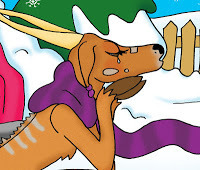 6. Be yourself. This is one of the hardest for me. I don’t know why but I get intimidated around successful authors and editors. I clam up and become shy—which is not me at all! Just relax and know that everyone there is just like you. They have written something, or are writing something and they want it shared with the world. There is no difference other than the perceptions you create in your mind. Be yourself and be friendly. When I say be yourself I mean your “nice looking” self. Don’t go dressed in your pajamas or dressed like Yoda. It’s so hard to take you serious when you don’t dress serious. Dress relaxed, you will be sitting for a long time and you want to be comfortable, but dress nice and be clean. You only have one shot at making a first good impression.
6. Be yourself. This is one of the hardest for me. I don’t know why but I get intimidated around successful authors and editors. I clam up and become shy—which is not me at all! Just relax and know that everyone there is just like you. They have written something, or are writing something and they want it shared with the world. There is no difference other than the perceptions you create in your mind. Be yourself and be friendly. When I say be yourself I mean your “nice looking” self. Don’t go dressed in your pajamas or dressed like Yoda. It’s so hard to take you serious when you don’t dress serious. Dress relaxed, you will be sitting for a long time and you want to be comfortable, but dress nice and be clean. You only have one shot at making a first good impression.
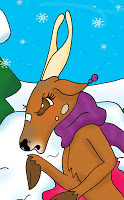 7. Be friendly and courteous to panelist, presenters, and other attendees. There is nothing worse than watching the expression on a panelist’s face as they are rushed by a hundred anxious authors. Remember that the agents and editors are also there to socialize and network, sure they hope that maybe they’ll find a best seller, but it’s not always their main objective. Never press your book onto them. Instead ask if they have a few minutes that you could share your work, or ask if they do pitch sessions. Also be courteous of their time. There is nothing more annoying that one person monopolizing someone’s time. I waited once behind a frantic author that wouldn’t let anyone else talk to this editor. By the time they were dismissed by the editor he turned to me. I felt so bad because his time had been so wasted, that I only asked for his business card. He looked relieved.
7. Be friendly and courteous to panelist, presenters, and other attendees. There is nothing worse than watching the expression on a panelist’s face as they are rushed by a hundred anxious authors. Remember that the agents and editors are also there to socialize and network, sure they hope that maybe they’ll find a best seller, but it’s not always their main objective. Never press your book onto them. Instead ask if they have a few minutes that you could share your work, or ask if they do pitch sessions. Also be courteous of their time. There is nothing more annoying that one person monopolizing someone’s time. I waited once behind a frantic author that wouldn’t let anyone else talk to this editor. By the time they were dismissed by the editor he turned to me. I felt so bad because his time had been so wasted, that I only asked for his business card. He looked relieved.
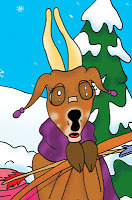 8. No stare downs.Imagine you are sitting in a crowded room and one person keeps eying you. Time goes on and that one person keeps looking at you as if they are sending you telepathic messages. Then after 40 minutes of staring is over, they rush to you and start sharing what they know you’ve been feeling for the past 40 minutes. This is not the way to go. Yes editors, agents, even authors have felt that special eye on them. They will not hear you if you are attempting to communicate telepathically. Don’t stare them down like they’re your bridge to fame and glory. You might scare them away and ruin a great opportunity.
8. No stare downs.Imagine you are sitting in a crowded room and one person keeps eying you. Time goes on and that one person keeps looking at you as if they are sending you telepathic messages. Then after 40 minutes of staring is over, they rush to you and start sharing what they know you’ve been feeling for the past 40 minutes. This is not the way to go. Yes editors, agents, even authors have felt that special eye on them. They will not hear you if you are attempting to communicate telepathically. Don’t stare them down like they’re your bridge to fame and glory. You might scare them away and ruin a great opportunity.
9. Bring snacks and water.Don’t forget that you need to eat and you need to drink—and you’ll need to go to the bathroom. The conferences can get crowded, especially at the larger events. You may have scored a great seat but you were so hungry you gave it up to find a hamburger and diet coke. As for the bathroom, it’s okay to ask the person sitting next to you to save your seat. Also bring some Tylenol or ibuprofen. Nothing can ruin a conference like a bad headache.
10. Have fun!Remember that this is to be your number one goal in attending this conference. If you are there to enjoy yourself them you will enjoy every minute of it. And I hope you do. Now go pack your bags!
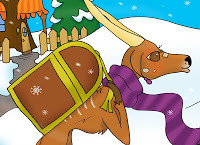 Again, if you have any tips you’d like to share, please do so. I hope that you have the opportunity to attend a conference this year. It’s a great goal to make. I wish you the best in all your achievements. And that’s my key on writing conferences.
Again, if you have any tips you’d like to share, please do so. I hope that you have the opportunity to attend a conference this year. It’s a great goal to make. I wish you the best in all your achievements. And that’s my key on writing conferences.
Art taken from Bongo Flo, written by Carolyn Quist and Illustrated by me. :)
 I attended my first writer’s conference about seven years ago and thought it was the greatest experience ever. However, I felt that I could have enjoyed it a lot more had I received some tips from others before I went. The purpose of this post is to hopefully share some tips on those of you desiring to attend conferences this year. I am going to share 10 tips, although I believe there are so many more that I’m not sharing. If you have any words of advice that will benefit others I invite you to share it in the comments.
I attended my first writer’s conference about seven years ago and thought it was the greatest experience ever. However, I felt that I could have enjoyed it a lot more had I received some tips from others before I went. The purpose of this post is to hopefully share some tips on those of you desiring to attend conferences this year. I am going to share 10 tips, although I believe there are so many more that I’m not sharing. If you have any words of advice that will benefit others I invite you to share it in the comments.1. Plan ahead.Most conferences will share an online schedule or outline of what will be presented at each session. Read it thoroughly and highlight the events that you feel would benefit you the most. Don’t forget to plan out breaks for yourself as well.
2. Have a laptop or note taking device. My first conference I didn’t have anything. I jotted notes down on the back of a program and ended up buying on overpriced notebook to take notes. You will receive some of the best advice from experienced authors, agents, and editors at these conferences. Do not waste that knowledge by not writing it down.
 3. Have your elevator speech ready.If you don’t know what I mean here, I’m talking about your hook or sales pitch for your book. You never know who you will run into at these conferences. An elevator speech is something you can plan ahead of time. Review it and say it out loud over and over again. If you ever have a half a minute of an editor’s attention don’t waste it with “umm…umm…” Think of it in this context: You get on the elevator on the fifth floor of the hotel and an editor is there waiting. You have until the main floor to sale your book. What are you going to say? I can’t tell you how embarrassed I was when I met an editor at a conference and he asked me how my work was going, that right he asked me, I then blew it and before I knew it my opportunity was over. Be ready and be prepared. In case that rare moment happens, bring a proposal package. A lot of people might say this isn’t necessary, but you never know. I understand that most of the agents and editors simply don’t have the room to carry a bunch of proposals, but what if you have the opportunity to have a pitch session with an agent or editor and you have nothing to show or give them. It never hurts to be prepared. And you’ll feel more confident knowing you have the package on hand. You may never use it or even think about it, but it never hurts to have a backup. What to have in your package: a basic cover sheet with hook (query), a brief synopsis, first three chapters, or the full manuscript.
3. Have your elevator speech ready.If you don’t know what I mean here, I’m talking about your hook or sales pitch for your book. You never know who you will run into at these conferences. An elevator speech is something you can plan ahead of time. Review it and say it out loud over and over again. If you ever have a half a minute of an editor’s attention don’t waste it with “umm…umm…” Think of it in this context: You get on the elevator on the fifth floor of the hotel and an editor is there waiting. You have until the main floor to sale your book. What are you going to say? I can’t tell you how embarrassed I was when I met an editor at a conference and he asked me how my work was going, that right he asked me, I then blew it and before I knew it my opportunity was over. Be ready and be prepared. In case that rare moment happens, bring a proposal package. A lot of people might say this isn’t necessary, but you never know. I understand that most of the agents and editors simply don’t have the room to carry a bunch of proposals, but what if you have the opportunity to have a pitch session with an agent or editor and you have nothing to show or give them. It never hurts to be prepared. And you’ll feel more confident knowing you have the package on hand. You may never use it or even think about it, but it never hurts to have a backup. What to have in your package: a basic cover sheet with hook (query), a brief synopsis, first three chapters, or the full manuscript. 4. Give out your business cards.You are going to meet some of the best people in your career at these conferences. You want them to remember you. Say something they will remember and give them your business card. You can get business cards very cheap and keep them in your pocket. It’s easy to just pull one out and offer it.
5. Collect business cards.As you are giving your cards out, collect them. Write down on the back of the card a quick note to remind you of what you said to that person as you spoke. It’s always nice if you are querying an editor you met to remind them of your meeting and what you spoke about. It shows that you took the time to show interest in them—and it goes a long way.
 6. Be yourself. This is one of the hardest for me. I don’t know why but I get intimidated around successful authors and editors. I clam up and become shy—which is not me at all! Just relax and know that everyone there is just like you. They have written something, or are writing something and they want it shared with the world. There is no difference other than the perceptions you create in your mind. Be yourself and be friendly. When I say be yourself I mean your “nice looking” self. Don’t go dressed in your pajamas or dressed like Yoda. It’s so hard to take you serious when you don’t dress serious. Dress relaxed, you will be sitting for a long time and you want to be comfortable, but dress nice and be clean. You only have one shot at making a first good impression.
6. Be yourself. This is one of the hardest for me. I don’t know why but I get intimidated around successful authors and editors. I clam up and become shy—which is not me at all! Just relax and know that everyone there is just like you. They have written something, or are writing something and they want it shared with the world. There is no difference other than the perceptions you create in your mind. Be yourself and be friendly. When I say be yourself I mean your “nice looking” self. Don’t go dressed in your pajamas or dressed like Yoda. It’s so hard to take you serious when you don’t dress serious. Dress relaxed, you will be sitting for a long time and you want to be comfortable, but dress nice and be clean. You only have one shot at making a first good impression.
 7. Be friendly and courteous to panelist, presenters, and other attendees. There is nothing worse than watching the expression on a panelist’s face as they are rushed by a hundred anxious authors. Remember that the agents and editors are also there to socialize and network, sure they hope that maybe they’ll find a best seller, but it’s not always their main objective. Never press your book onto them. Instead ask if they have a few minutes that you could share your work, or ask if they do pitch sessions. Also be courteous of their time. There is nothing more annoying that one person monopolizing someone’s time. I waited once behind a frantic author that wouldn’t let anyone else talk to this editor. By the time they were dismissed by the editor he turned to me. I felt so bad because his time had been so wasted, that I only asked for his business card. He looked relieved.
7. Be friendly and courteous to panelist, presenters, and other attendees. There is nothing worse than watching the expression on a panelist’s face as they are rushed by a hundred anxious authors. Remember that the agents and editors are also there to socialize and network, sure they hope that maybe they’ll find a best seller, but it’s not always their main objective. Never press your book onto them. Instead ask if they have a few minutes that you could share your work, or ask if they do pitch sessions. Also be courteous of their time. There is nothing more annoying that one person monopolizing someone’s time. I waited once behind a frantic author that wouldn’t let anyone else talk to this editor. By the time they were dismissed by the editor he turned to me. I felt so bad because his time had been so wasted, that I only asked for his business card. He looked relieved. 8. No stare downs.Imagine you are sitting in a crowded room and one person keeps eying you. Time goes on and that one person keeps looking at you as if they are sending you telepathic messages. Then after 40 minutes of staring is over, they rush to you and start sharing what they know you’ve been feeling for the past 40 minutes. This is not the way to go. Yes editors, agents, even authors have felt that special eye on them. They will not hear you if you are attempting to communicate telepathically. Don’t stare them down like they’re your bridge to fame and glory. You might scare them away and ruin a great opportunity.
8. No stare downs.Imagine you are sitting in a crowded room and one person keeps eying you. Time goes on and that one person keeps looking at you as if they are sending you telepathic messages. Then after 40 minutes of staring is over, they rush to you and start sharing what they know you’ve been feeling for the past 40 minutes. This is not the way to go. Yes editors, agents, even authors have felt that special eye on them. They will not hear you if you are attempting to communicate telepathically. Don’t stare them down like they’re your bridge to fame and glory. You might scare them away and ruin a great opportunity. 9. Bring snacks and water.Don’t forget that you need to eat and you need to drink—and you’ll need to go to the bathroom. The conferences can get crowded, especially at the larger events. You may have scored a great seat but you were so hungry you gave it up to find a hamburger and diet coke. As for the bathroom, it’s okay to ask the person sitting next to you to save your seat. Also bring some Tylenol or ibuprofen. Nothing can ruin a conference like a bad headache.
10. Have fun!Remember that this is to be your number one goal in attending this conference. If you are there to enjoy yourself them you will enjoy every minute of it. And I hope you do. Now go pack your bags!
 Again, if you have any tips you’d like to share, please do so. I hope that you have the opportunity to attend a conference this year. It’s a great goal to make. I wish you the best in all your achievements. And that’s my key on writing conferences.
Again, if you have any tips you’d like to share, please do so. I hope that you have the opportunity to attend a conference this year. It’s a great goal to make. I wish you the best in all your achievements. And that’s my key on writing conferences.Art taken from Bongo Flo, written by Carolyn Quist and Illustrated by me. :)
Published on January 02, 2013 18:34
December 31, 2012
Make it Happen: Goals for 2013
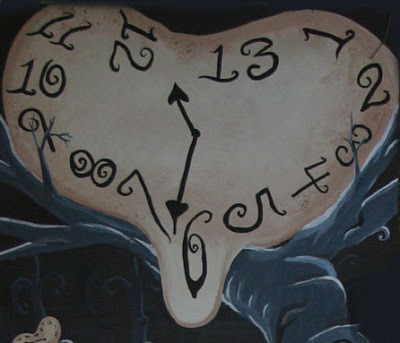 In just a few hours it will be a new year! The mark of a new year traditionally comes with the reviewing of past goals and the setting of new plans for achievement. I’ve heard it said that a goal now written down is not a goal, but a wish. In efforts of making my goals become reality I’d like to share them here. Maybe with more people seeing what I plan to achieve it will keep me on track.
In just a few hours it will be a new year! The mark of a new year traditionally comes with the reviewing of past goals and the setting of new plans for achievement. I’ve heard it said that a goal now written down is not a goal, but a wish. In efforts of making my goals become reality I’d like to share them here. Maybe with more people seeing what I plan to achieve it will keep me on track.2012 was a slamming good year for me in writing and illustrating. Over the course of this year I was able to become a freelance illustrator, illustrate three picture books for two great authors, and I was able to write and illustrate three of my own, which I also published. I also edited the first novel in my Dream Keepers series and wrote the second. Although I have not achieved my goal of getting an agent and a contract for The Dream Keeper I will continue in my efforts to see that goal achieved in 2013.
My writing/illustrating goals for 2013:
1. To have my Dream Keeper Seriescontracted by a traditional publisher.2. Finish the third book and prequel to the Dream Keeper Series, and finish one other full length book (not a picture book).3. Market the crap out of my picture books so I can afford to keep illustrating.4. Be a full time writer/illustrator by the end of the year.5. Write and illustrate four picture books, two in my ABC series, one in the Bean’s series, and one more fun and fantastic picture book.6. Obtain more author clients for my freelance illustrating business.7. Attend more than just one writers conference.8. Be actively involved in my writers group.9. Be able to be myself around other authors that intimidate the crap out of me because they are more successful.10. Share my dreams with the world.
Okay those are my top ten goals for 2013. I’d love to hear what your goals are. I also wanted to share an ABC of achieving your goals/dreams. I came across it about ten years ago and I continue to reflect on it now and then. Enjoy 2013 and make it a year to remember! Best wishes and God bless you!
Avoid negative sources, people, things and habits.Believe in yourself.Consider things from every angle.
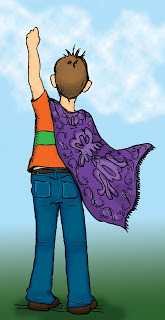 Don't give up and don't give in.Enjoy life today, yesterday is gone, tomorrow may never come.Family and friends are hidden treasures; seek them and enjoy their riches.Give more than you planned to.Hang on to your dreams.Ignore those who try to discourage you.Just do it!Keep trying no matter how hard it seems, it will get easier.Love yourself first and most.Make it happen.Never lie, cheat, or steal, always make a fair deal.Open your eyes and see things as they really are.Pray… practice makes perfect.Quitters never win and winners never quit.Read, study, and learn about everything important in life.Stop procrastinating.Take control of your own destiny.Understand yourself in order to better understand others.Visualize it.Want it more than anything.X-cellerate your efforts.You are unique in all of God's creations, nothing can replace YOU.Zero in on your target and go for it.Author Unknown
Don't give up and don't give in.Enjoy life today, yesterday is gone, tomorrow may never come.Family and friends are hidden treasures; seek them and enjoy their riches.Give more than you planned to.Hang on to your dreams.Ignore those who try to discourage you.Just do it!Keep trying no matter how hard it seems, it will get easier.Love yourself first and most.Make it happen.Never lie, cheat, or steal, always make a fair deal.Open your eyes and see things as they really are.Pray… practice makes perfect.Quitters never win and winners never quit.Read, study, and learn about everything important in life.Stop procrastinating.Take control of your own destiny.Understand yourself in order to better understand others.Visualize it.Want it more than anything.X-cellerate your efforts.You are unique in all of God's creations, nothing can replace YOU.Zero in on your target and go for it.Author Unknown
Published on December 31, 2012 07:19
December 28, 2012
My Path to Publishing

Recently I’ve had quite a few people ask me about my experience with self-publishing my picture books. I thought I’d share some of what I’ve told others here.
My road in traditional publishing hasn’t ended, but it has taken a detour. It was always my intention to publish traditionally so I could become a mainstream author/illustrator. I have been querying to agents and publishers for a few years trying to sell my books. I wasn’t having much success and I was getting a little discouraged. It’s a hard and long road to travel. I did get good feedback along the way from agents and editors, which is very valuable and you need to listen whenever they give advice, but they never accepted my books.
 In early September 2012 I was contacted by Jim Long, an author interested in hiring me as a freelance illustrator. It was a Christmas story called Lucius and the Christmas Star. Jim didn’t want to mess around with traditional publishing for his book. He is an older gentleman and just wanted his books out for his family and friends to buy. He asked me to independently publish it for him. The process to do this was easy and very affordable (if you know the formatting involved). We released the book on the last day of November through CreateSpace.com, an online independent publishing platform owned by Amazon. They distribute nationally online. You can pay an extra $25 to distribute worldwide and this allows your book to be put into bookstores and libraries. The downfall is, unlike the big boy publishers who have a marketing team (once your book is released you get your own team for a year), you are your own marketer. It’s up to you to sell your books.
In early September 2012 I was contacted by Jim Long, an author interested in hiring me as a freelance illustrator. It was a Christmas story called Lucius and the Christmas Star. Jim didn’t want to mess around with traditional publishing for his book. He is an older gentleman and just wanted his books out for his family and friends to buy. He asked me to independently publish it for him. The process to do this was easy and very affordable (if you know the formatting involved). We released the book on the last day of November through CreateSpace.com, an online independent publishing platform owned by Amazon. They distribute nationally online. You can pay an extra $25 to distribute worldwide and this allows your book to be put into bookstores and libraries. The downfall is, unlike the big boy publishers who have a marketing team (once your book is released you get your own team for a year), you are your own marketer. It’s up to you to sell your books. 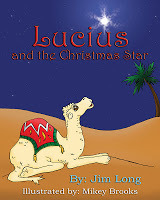 After seeing how easy it was to publish Lucius and the Christmas Star, I decided to self-publish the two children’s books that I had already finished. I was excited to see my friends and family jump at the opportunity to buy my books. And better yet when I received a phone call from a family who had purchased the books they shared how much they loved them—this made everything worth it. Unfortunately I have received some negative feedback. Not from the books, but from how I went about publishing them. It is sad to say that there are still some that share a negative perspective on self-published authors. I thought that will all the success of some independent authors this stigma would have gone away. I hope that in time it can change and readers can embrace all aspects of writing whether printed by a large publisher or a one man operation. My goal is still to be a traditional published author; however, I feel in this day and age we should be able to be a type of highbred author who can share their art in both forums.
After seeing how easy it was to publish Lucius and the Christmas Star, I decided to self-publish the two children’s books that I had already finished. I was excited to see my friends and family jump at the opportunity to buy my books. And better yet when I received a phone call from a family who had purchased the books they shared how much they loved them—this made everything worth it. Unfortunately I have received some negative feedback. Not from the books, but from how I went about publishing them. It is sad to say that there are still some that share a negative perspective on self-published authors. I thought that will all the success of some independent authors this stigma would have gone away. I hope that in time it can change and readers can embrace all aspects of writing whether printed by a large publisher or a one man operation. My goal is still to be a traditional published author; however, I feel in this day and age we should be able to be a type of highbred author who can share their art in both forums. There have been many payoffs with self-publishing. The first that comes to mind is that its total control. I am slightly OCD and like to have everything a specific way (my way). Self-publishing allows you the freedom to make your book the way you want it to be, and not what some stranger wants it to be. That’s one incentive, there are more like the instant feeling of accomplishment, but this isn’t a post about the pros and cons of self-publishing, although I might have one soon. The downfall is not just the stigma of being a self-published author; there is also the upfront cost. For some it’s not a large amount of money, but for some having to put a bit of money toward something you may or may not get a return on it daunting. A traditional house does foot the bill, but that doesn’t guarantee sales either. I’ve have found that if I want my book to sell, then I have to sell it. I believe this is the case whether you call yourself traditionally published or not.
There have been many payoffs with self-publishing. The first that comes to mind is that its total control. I am slightly OCD and like to have everything a specific way (my way). Self-publishing allows you the freedom to make your book the way you want it to be, and not what some stranger wants it to be. That’s one incentive, there are more like the instant feeling of accomplishment, but this isn’t a post about the pros and cons of self-publishing, although I might have one soon. The downfall is not just the stigma of being a self-published author; there is also the upfront cost. For some it’s not a large amount of money, but for some having to put a bit of money toward something you may or may not get a return on it daunting. A traditional house does foot the bill, but that doesn’t guarantee sales either. I’ve have found that if I want my book to sell, then I have to sell it. I believe this is the case whether you call yourself traditionally published or not.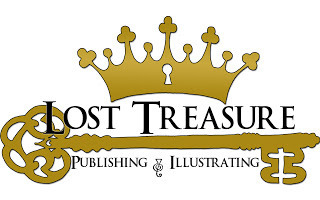 I hope this post has given you some insight on the self-publishing world and why I chose to be a part of it. I don’t believe that anyone should limit their art to just one way of distributing. The bottom line is it all comes down to what you want. I made this decision through lots of personal thought and prayer. I encourage you to do the same. I strongly agree with Tracy Hickman when he said, “A book doesn’t exist, until it is read.” I just want my books to be enjoyed. No one can see them when they are sitting in the prison of my computer.
I hope this post has given you some insight on the self-publishing world and why I chose to be a part of it. I don’t believe that anyone should limit their art to just one way of distributing. The bottom line is it all comes down to what you want. I made this decision through lots of personal thought and prayer. I encourage you to do the same. I strongly agree with Tracy Hickman when he said, “A book doesn’t exist, until it is read.” I just want my books to be enjoyed. No one can see them when they are sitting in the prison of my computer.And that’s my key on my path to publishing.
Published on December 28, 2012 10:39
Guest post on Wendy Knight's Blog
Drawing out a book: some tips on storyboards and writing. Check it out: http://writethroughthenoise.blogspot.com/2012/12/guest-post-by-mikey-brooks.html
Published on December 28, 2012 09:35
December 7, 2012
Author Interview: Cas Peace, author of The Artesans of Albia Series
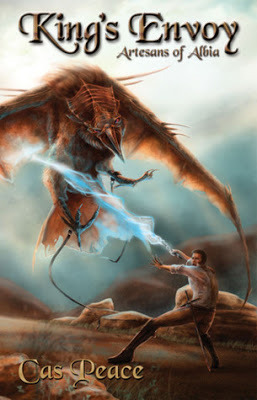 I am delighted to introduce you to a great friend and a fabulous writer, Cas Peace. I was fortunate to meet Cas this past June at a Rhemalda Publishing Conference held in Salt Lake City, Utah. Cas and her husband had traveled all the way from North Hampshire, UK, to take part in the conference and I am so glad she did. I was able to chat with her a bit at the conference about her publishing experience and listened to her deliver an incredible presentation on Fantasy World Building (this is available at the end of this post).
I am delighted to introduce you to a great friend and a fabulous writer, Cas Peace. I was fortunate to meet Cas this past June at a Rhemalda Publishing Conference held in Salt Lake City, Utah. Cas and her husband had traveled all the way from North Hampshire, UK, to take part in the conference and I am so glad she did. I was able to chat with her a bit at the conference about her publishing experience and listened to her deliver an incredible presentation on Fantasy World Building (this is available at the end of this post).
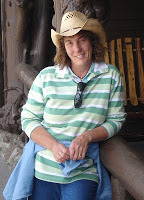
Cas Peace is the author of the non-fiction book For the Love of Daisy and the fantasy series Artesans of Albia. The first novel in the Artesans series, King's Envoy, was published by Rhemalda Publishing in 2011. Book Two in this series, King's Champion, was published this year and Book Three, King's Artesan, will be released in July 2013. Aside from writing Cas is a freelance editor and offers a variety of author helps on her website: www.caspeace.com. I hope you enjoy her interview.
Cas, you have created a very complex world with your Artesans of Albiaseries. Can you share how you created your world?
Cas Peace: I can honestly say that my world of five realms grew and developed as my writing progressed. I didn’t ever intend to be a writer, let alone the author of a nine-novel fantasy series, so I can’t pretend that there was much in the way of forward planning when it came to the type of world I wanted my characters to live in. What I did was to concentrate on the plot, the action and the emotion of the story and allow the physical properties of my world to wrap themselves around and conform to what was needed. New settings, realms or physical attributes were added as they became necessary. Quite an organic approach to world building, I guess, but it worked for me! And I knew it was working because each time I needed my world to expand, it did so with no effort. I would often find that I had already laid the foundations for what I needed without even knowing it would arise. This was only one of the spooky things that happened while I was writing the series, and I still don’t understand how or why!
You also created an amazing magic system in your world. Are magic systems important and why do you feel magic should have limitations?
Cas Peace: This was one area where I did know ahead of time what I wanted. (Maybe the only area!) I have always felt very close to Nature, and I consider myself a very spiritual person. Not only in a religious way, but also in the sense of being aware of the forces and workings of the natural world. I have a fascination for the old religions – Druidism and shamanism, for example – and I believe we humans are losing something precious when we cease to be in tune with the natural elements that nurture us. I wanted to create a system of power that was quite different to what we have come to recognize as “magic”. I wanted power-users who were not magicians or wizards, but people who retained a heightened awareness of the earth that created them. Maybe in this way, I could gently nudge readers into thinking about this subject for themselves and make them aware that you can hear and feel and interact with the deeper forces of the earth, if only you open up to them and listen very carefully.On the subject of limitations, the answer is that any power or force or “magic” simply must have limitations. It would not be credible if power-users could do absolutely anything they liked, and for readers, going through the learning and growing process with a character is something we all can relate to. We each have our unique strengths and weaknesses, and different readers can identify with different characters and come to understand how and why they react as they do by seeing them strive, fail, and succeed. That’s how heroes are born! In King's Envoy there was a line that stuck out to me. I believe it was Bull who warned Taran not to fall in love with Sullyan because everyone did. I found it funny because the more I read the more I think I too was falling in love. Can you share tips on how to create a lovable character?
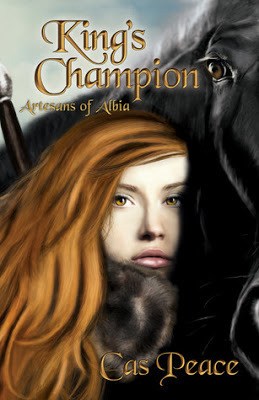 Cas Peace: I love it that you felt that way! To a writer, there is no greater praise than to have a reader say that they fell in love with a particular character, or cried with them. I didn’t originally set out to create a character that everyone would come to love. But as Sullyan developed, I realized just how charismatic she was. And I don’t believe it’s the way she looks, either. Yes, she’s beautiful, but I know many beautiful people who have nasty natures. Sullyan’s best attribute, I believe, and the one that affects people most, is the depth of her care. She’s completely loyal, both to her friends and her superiors, and she’ll fight like a lion to defend anyone she thinks is getting a raw deal. She puts others before herself, and has no personal ambition other than to use her skills – whether with sword or Artesan powers – to serve those she loves. She is also fallible, and recognizes it. This, I think, gives her the qualities that draw people to her. So I would say, if you want to create a character that readers can really get to grips with (not every writer wants their main characters to be lovable!) then decide who that character is and focus on what makes them that way. Stay true to those attributes and they will come alive in your readers’ minds. You live in the UK. Masters like Tolkien and Lewis used their country’s surroundings as inspiration in their books. Do you find your worlds mimicking the world around you?
Cas Peace: I love it that you felt that way! To a writer, there is no greater praise than to have a reader say that they fell in love with a particular character, or cried with them. I didn’t originally set out to create a character that everyone would come to love. But as Sullyan developed, I realized just how charismatic she was. And I don’t believe it’s the way she looks, either. Yes, she’s beautiful, but I know many beautiful people who have nasty natures. Sullyan’s best attribute, I believe, and the one that affects people most, is the depth of her care. She’s completely loyal, both to her friends and her superiors, and she’ll fight like a lion to defend anyone she thinks is getting a raw deal. She puts others before herself, and has no personal ambition other than to use her skills – whether with sword or Artesan powers – to serve those she loves. She is also fallible, and recognizes it. This, I think, gives her the qualities that draw people to her. So I would say, if you want to create a character that readers can really get to grips with (not every writer wants their main characters to be lovable!) then decide who that character is and focus on what makes them that way. Stay true to those attributes and they will come alive in your readers’ minds. You live in the UK. Masters like Tolkien and Lewis used their country’s surroundings as inspiration in their books. Do you find your worlds mimicking the world around you?Cas Peace: The one thing I knew from the start about the setting for my novels was that it would be some kind of medieval world. One reason for this was so I could use and incorporate my love and knowledge of horses. The other was that I have long been interested in English medieval history, so to some extent I would be writing what I knew. It might also be a little kickback on my part against too much technology. I am well aware that my view of medieval England is highly romanticized, and that if I were to be transported back in time to the 13th or 14th centuries, I would certainly not like it, or last long! But I do often hanker after a simpler life, and believe that we humans would be better off if we had to work together more and couldn’t shut ourselves away behind steel and glass office windows. As I said before, I also love Nature, and I am surrounded by countryside where I live. I particularly love trees, and could easily have set my books within a forest. Hmm … good idea; maybe the next ones will be!
You’ve had some interesting marketing ideas to get the word out on your book. You have even performed a ballad taken from King’s Envoy live in a shopping mall. Are there any tips you can share on promoting books?
Cas Peace: Ah – that thorny word: Promotion! You either love it or hate it, I think. Many writers and authors are quite shy and reclusive – that’s why we write, we live vicariously! However, anyone who is serious about becoming published must also embrace the idea of self-promotion. If you are someone who loves and uses social media, then chances are you’re already ahead of the game. If you have a popular blog or other social platform – so much the better. Other than that, the only advice I can give is try to find your book’s, or your personal, USP (Unique Selling Point.) It doesn’t actually have to be anything to do with your book at first. Mine wasn’t. As you say, I performed a song from King’s Envoyin a shopping mall. I was a folk singer long before I was a writer, so putting songs and music into my books came naturally. Then I realized that this could be my USP – how many authors can you name who have songs associated with their books, songs they record and sing themselves? There was already a song written into King’s Envoy, and other songs are mentioned as the series goes on. So I decided I would write at least one song per book –and maybe more, who knows? – and record them to use as promo material. The one from King’s Envoy, “The Wheel Will Turn”, is available as a free download from Rhemalda’s website and my own, and the last time I checked had been downloaded over 30,000 times. That’s HUGE! I am also about to release the song from King’s Champion, “The Ballad of Tallimore”, and this will also be available free. I’ve also had radio interest in the songs, which gives me a chance to do interviews and plug my books. So to writers concerned about promotion I would say – what USP can you find in either yourself or your work that you can exploit?
Download the Ballad FREE from Rhemalda’s website: http://www.rhemalda.com/wp-content/uploads/2011/12/the_wheel_will_turn_cas_peace.mp3
Aside from writing and freelance editing you are also an animal advocate. Can you share more on that? I love animals myself.
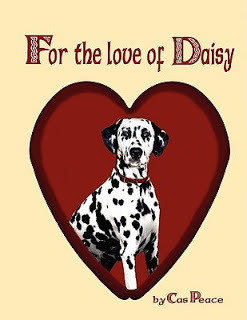 Cas Peace: My affinity with and love of animals goes back to my earliest memories. We didn’t have pets at home – my parents considered them a tie – but our neighbors both had dogs. Neither were particularly nice dogs, one was a yappy Pug with runny eyes, and the other was a snappy Dachshund which would bite if you leaned too far over the wall. Yet they didn’t stop me loving dogs, so I think it must be something in my genes. My main loves are dogs and horses, and I’ve managed to have relationships with both, although I don’t have a horse any more. I am also a firm advocate of rescue centers, and very against indiscriminate breeding of pets and horses. I have had six dogs so far. The first two were rescue Lurchers, Emma and Ria; the middle two, Daisy and Pepper, were bought as pedigree puppies from reputable breeders, and my current two, Milly and Milo, are also rescue Lurchers. You can see them, plus Daisy and Pepper, on my website. I really should add pages for Emma and Ria as well – they were so gorgeous!
Cas Peace: My affinity with and love of animals goes back to my earliest memories. We didn’t have pets at home – my parents considered them a tie – but our neighbors both had dogs. Neither were particularly nice dogs, one was a yappy Pug with runny eyes, and the other was a snappy Dachshund which would bite if you leaned too far over the wall. Yet they didn’t stop me loving dogs, so I think it must be something in my genes. My main loves are dogs and horses, and I’ve managed to have relationships with both, although I don’t have a horse any more. I am also a firm advocate of rescue centers, and very against indiscriminate breeding of pets and horses. I have had six dogs so far. The first two were rescue Lurchers, Emma and Ria; the middle two, Daisy and Pepper, were bought as pedigree puppies from reputable breeders, and my current two, Milly and Milo, are also rescue Lurchers. You can see them, plus Daisy and Pepper, on my website. I really should add pages for Emma and Ria as well – they were so gorgeous!I also champion wildlife as much as I can and support many animal charities. I’m appalled at the way we are destroying the wild areas of our world – we are slowly destroying ourselves and are too stupid to see it. Maybe one day we will realize that we CANNOT exist without the full range of creatures this wonderful Earth contains. I only hope it won’t be too late.
Last question: besides your terrific books, what book would you recommend every author have on their shelf?
Cas Peace: I hope this won’t sound too boring, but I’m going to say Roget’s Thesaurus. I got my first one as an 18thbirthday present from my maternal great-aunts, and 37 years later it still has pride of place on my shelf. If I’m actively writing I use it every day, and often refer to it when I’m editing for clients too. I find it invaluable. I also much prefer to use my loved and much-thumbed print copy than look stuff up online. For some reason I trust my faithful book much more than I trust the internet!Reference books aside, I would say that whatever genre you write in, make sure you have at least one book by a master of that genre in your bookcase. Use it for inspiration, and as a source of learning what works and what doesn’t.
Mikey, I have really enjoyed answering your interesting questions and I’d like to thank you for asking me to do this interview. I love the talent you have as an illustrator and I also know what great writing talent you possess. I want to wish you the best of luck with your own work.
Thank you Cas! You are such a pleasure to talk with and I love your books! I feel so honored to have had you as a guest on my blog.
Links and Other Information:Shouting out my Writers’ Services. As well as being a fantasy and non-fiction author, I’m also a freelance editor. I copy-edit, line-edit, proofread and critique, and I can also help writers who are in the planning stages. I don’t handle poetry or academic work. Neither do I have a fixed Price List. Because I like helping writers achieve their dreams, I prefer to work with what an individual can afford. Please see my website and feel free to contact me for a personal quote. www.caspeace.com/writers-services
Anyone who would like a signed copy of any of my books can get them from my website, but I do realize the US readers might not want to pay mailing costs from the UK. Watch out for the third book in my Artesans series – King’s Artesan – due out in July 2013.
Below are the links to my books on Amazon.com. They are also available from Amazon.co.uk, Barnes & Noble, and also the Rhemalda Bookshop. And here I’d like to thoroughly recommend the books of all my fellow Rhemalda authors. They are a fantastic bunch and between them have published a whole host of wonderful books in many genres. Go check some out (but get mine first!!) J
King’s Envoy : http://www.amazon.com/Kings-Envoy-Artesans-Cas-Peace/dp/1936850133/ref=sr_1_1?s=books&ie=UTF8&qid=1354724269&sr=1-1&keywords=king%27s+envoy+cas+peace
King’s Champion: http://www.amazon.com/Kings-Champion-Artesans-Albia-Book/dp/1936850095/ref=sr_1_1?s=books&ie=UTF8&qid=1354724320&sr=1-1&keywords=king%27s+champion+cas+peace
For the Love of Daisy : http://www.amazon.com/Love-Daisy-Cas-Peace/dp/0955488982/ref=sr_1_1?s=books&ie=UTF8&qid=1354724373&sr=1-1&keywords=for+the+love+of+daisy+cas+peace
For More information on Cas Peace and her works visit: www.caspeace.comwww.rhemalda.comhttp://rhemalda.com/authors/p/cas-pea...Watch the King's Envoy book trailer:http://rhemalda.com/2011/04/kings-env...Find me on Facebook:http://www.facebook.com/?ref=home#!/c...
Published on December 07, 2012 07:13



